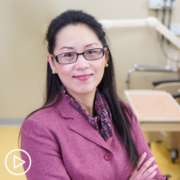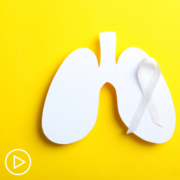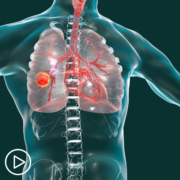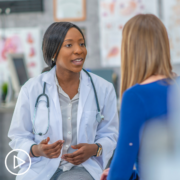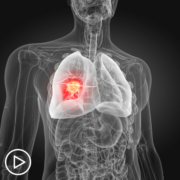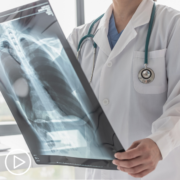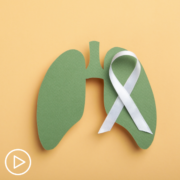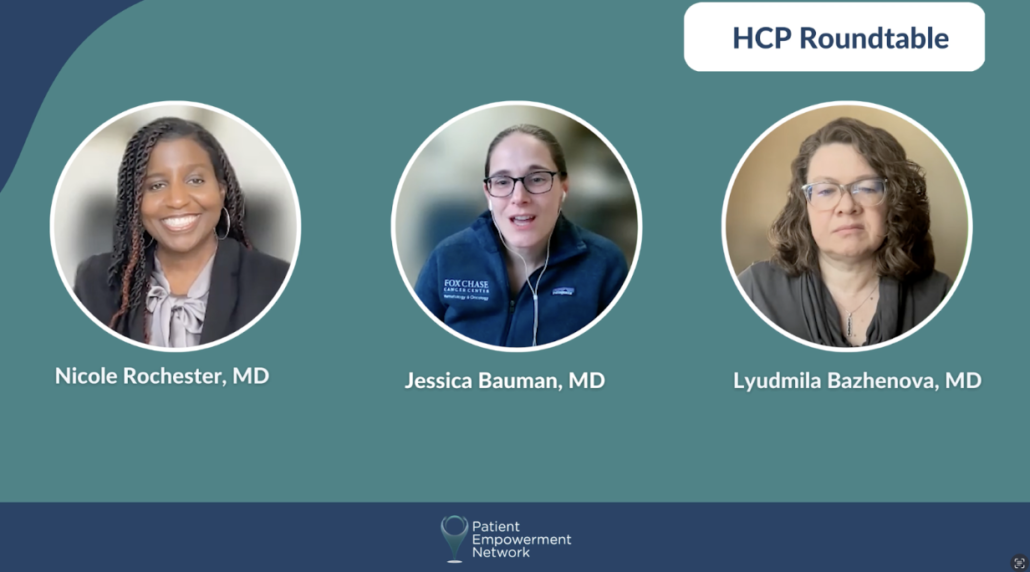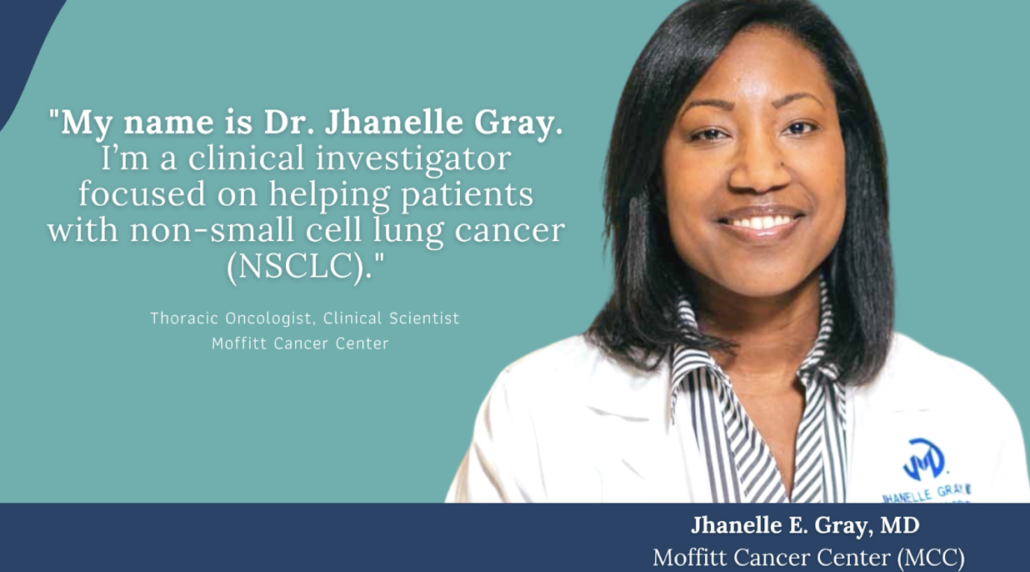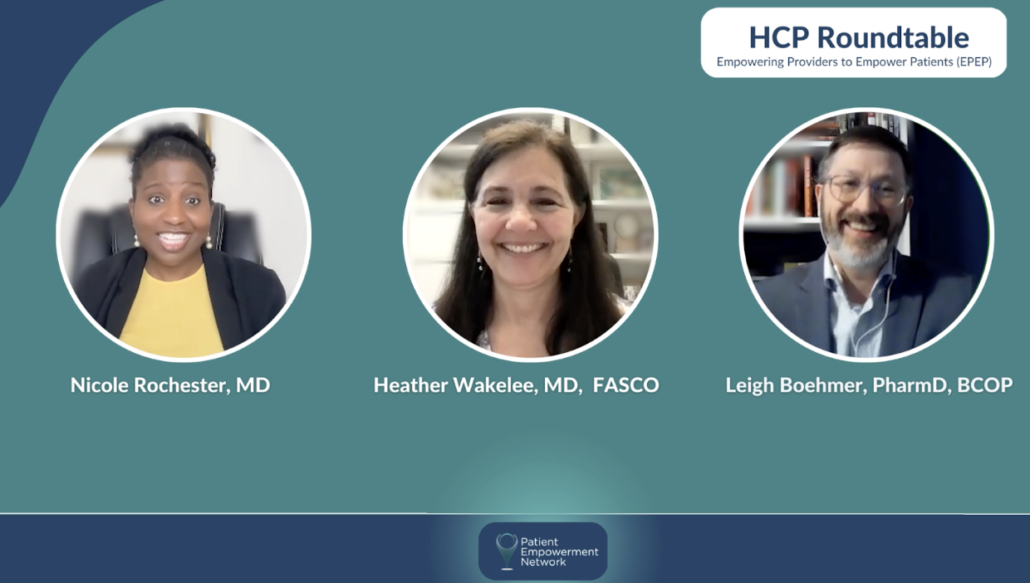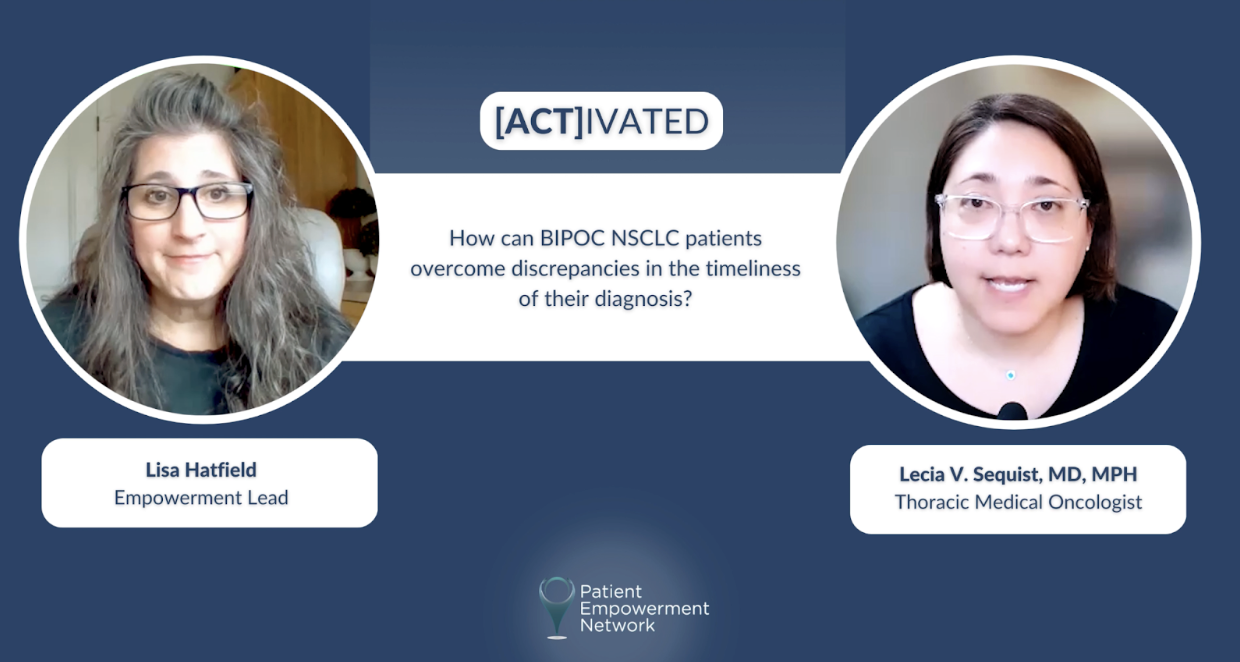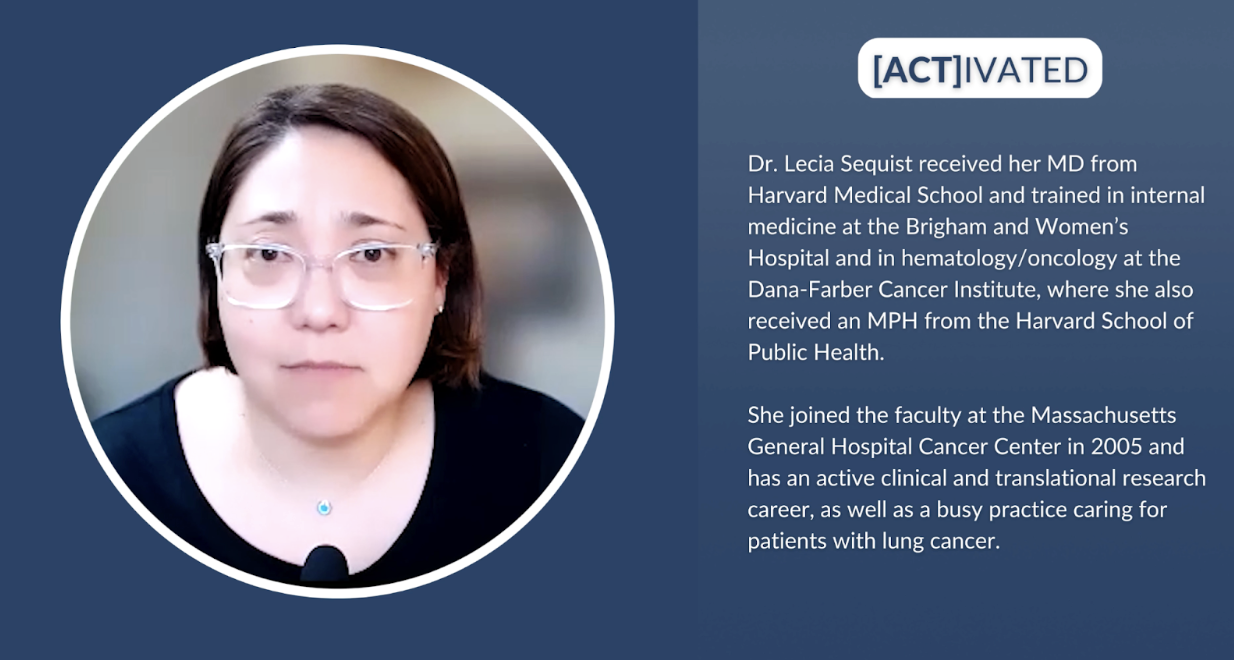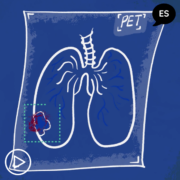Why Test Results Matter | Accessing Personalized Non-Small Cell Lung Cancer Treatment from Patient Empowerment Network on Vimeo.
Can test results affect non-small cell lung cancer treatment options? Dr. Erin Schenk reviews essential lung cancer testing, discusses how the results may influence treatment approaches, and explains why it’s important for patients to take an active role in their care and treatment choices.
Dr. Erin Schenk is a medical oncologist, lung cancer researcher, and assistant professor in the division of medical oncology at the University of Colorado Anschutz Medical Center.
Download Program Resource Guide
See More From INSIST! Lung Cancer
Related Resources:
Transcript:
Katherine Banwell:
Hello, and welcome. I’m Katherine Banwell, your host for today’s program. Today we’re going to discuss the latest advances in lung cancer including the role of genetic testing and how this may affect treatment options. Before we get into the discussion, please remember that this program is not a substitute for seeking medical advice. Please refer to your healthcare team about what might be best for you. Well, let’s meet our guest today. Joining me is Dr. Erin Schenk. Dr. Schenk, welcome, would you please introduce yourself?
Dr. Erin Schenk:
And thanks so much, Katherine. I’m Dr. Erin Schenk. I’m a medical oncologist at the University of Colorado and I have a great position where I’m able to take care of patients with lung cancer in the clinic and also, do laboratory-based research on new and different therapies for lung cancer. Thanks so much for having me.
Katherine Banwell:
That’s so great. Oh, I’m so glad you were able to join us today. Because this program is part of our Insist series which empowers patients to insist on better care. Can you tell us why you think it’s important for patients to speak up and engage in their lung cancer care decisions?
Dr. Erin Schenk:
Absolutely, and I think as a physician it’s important not only to partner with patients but as well as their loved ones and their caregivers who help navigate this diagnosis of lung cancer. There are some diagnoses in the world, cancer being one of them and lung cancer especially that can turn everything upside down. So, it completely changes your world. Suddenly the life as you’ve been living it, the plans you had they all have to be paused or halted in some way to get care for the lung cancer diagnosis.
One of the – and one of the really hopeful parts about being a doctor who cares for patients with lung cancer is just the speed of the advancements and the speed of the changes in the treatment options that we have for patients diagnosed with really any type of lung cancer.
And so, I think it’s really important when you’re meeting with your team and you’re talking with your cancer doctor to really try to understand what is the information that they use to make some of these decisions or referrals on your behalf? And also, think about, is there an opportunity for me to get another opinion about what might be the best options?
Katherine Banwell:
Thank you for that Dr. Schenk, that’s helpful as we begin our discussion today. I’d like to start with some basics. What are the various subtypes of lung cancer, and how are they identified?
Dr. Erin Schenk:
Absolutely. So, there are a number of different subtypes of lung cancer that are important for us to identify, because it helps to stratify or helps to select the right treatment approaches for a patient. So, usually when someone is diagnosed with lung cancer there was a scan done at some point that noticed a mass or masses in the body.
What happens next is a biopsy happens where a needle is used to sample the tissue, and that could be in the lung, that could be in lymph nodes or other parts of the body and that tissue that’s sampled is first sent to my colleagues in pathology.
And they’re a group of doctors who look at tissues underneath the microscope and try to identify what those are. And based on that initial pathology analysis, we can identify usually pretty straightforward, what is the type of cancer that they see under the microscope.
And so, in very general terms there are non-small cell lung cancers, there is a group called small cell lung cancers, and there’s also a group called neuroendocrine cancers as well. Oftentimes, times we’re able to differentiate these types of tumors, these types of lung cancers based on how different markers show up, and these are called stains.
And these stains can differentiate non-small cell between adenocarcinoma versus squamous cell carcinoma. And then they can also help differentiate small cell lung cancer. And then, of course, they can also help to identify if this is a neuroendocrine tumor.
Katherine Banwell:
Okay. Thank you so much for explaining that. Today we’re going to focus on non-small cell lung cancer. Are there specific tests that patients should ask their doctor for following a diagnosis?
Dr. Erin Schenk:
Absolutely, and I think it’s sometimes helpful to understand what are all the pieces of information I need when I first meet a patient to make decisions about treatments? So, we just went over the histology or another word, the pathology, what does the cancer look like underneath – under the microscope? That can help and that’s one of the pieces, understanding what type of non-small cell lung cancer is present.
Additional information that’s needed includes certain tests, and you might hear say like, molecular testing or sequencing. Those pieces of information can be really important for treatment selection. So, whether there’s a diagnosis of adenocarcinoma or squamous cell lung cancer, we always try to know the PD-L1 status. And that’s actually a surface marker that’s present on the outside of the cancer cells and is able to help us select immunotherapy treatments as appropriate.
Oftentimes, patients with lung adenocarcinoma will get further sequencing of the tumor itself. And again, you might hear of this called molecular testing or next-generation sequencing, NGS. There are a lot of terms we use for it, but fundamentally, what we’re trying to do is understand the vulnerabilities of the cancer cells.
And these vulnerabilities can be identified by these molecular tests. They often are able to recognize mutations or fusions or genetic changes within the cancer cells that are present. This is critically important, because we have a whole number of oral targeted therapies that can go after these mutations or alterations, and in other words, they go after the vulnerability in the cancer cells. That’s the adenocarcinoma histology.
That’s the majority of non-small cell lung cancer diagnoses but I think also if you have been told your diagnosis is of squamous lung cancer, classically we don’t often think of those driver alterations or those fusions or mutations that I just spoke about. But I think it’s also quite important for patients in that situation to also undergo molecular testing.
As we learn more and more, sometimes those squamous lung cancers can also bear those same alterations. Not to the same frequency, but they can be present, and I think it’s important as you’re thinking about a patient to try to understand what are all the tools I have for them to do that sequencing just to make sure you’re not missing something. So, that’s a really in-depth look to molecular testing.
I’d like to transition to some of the other tests that would be necessary to help put that molecular testing in context. Another important piece is something called staging. And staging is a way to determine if the lung cancer has traveled elsewhere in the body.
Sometimes it can be involved in the lymph nodes of the middle of the chest. Sometimes it can go outside the chest. For example, to the bones or the liver or the brain, and understanding that information, understanding that lay of the land before we start treatment, is really important, not only for treatment selection, like the treatments, the medicines I would give as a medical oncologist.
But also, in thinking about which other colleagues of mine who help take care of patients with lung cancer should I also involve in some of these treatment decisions. So, staging can often involve CT scans of the chest, abdomen, pelvis. A PET scan can be done. As well as an MRI of the brain.
Katherine Banwell:
Dr. Schenk, I just want to confirm that you’ve been speaking about molecular testing, that’s the same as biomarker testing, right?
Dr. Erin Schenk:
Exactly. Exactly.
Katherine Banwell:
And how is it performed?
Dr. Erin Schenk:
So, biomarker testing, molecular testing, NGS, there’s a whole range of synonyms we use, that is done primarily on the tumor tissue.
So, the first test that usually comes back is a marker on the cancer cell.
That’s PD-L1. That is an IHC test that is able to be done pretty quickly and we’re able to have a turnaround time of just a few days to understand that first biomarker. But the PD-L1 status does not make sense unless we have all of the other information to get the best context, the best understanding of the tumor and what drives the tumor. That additional testing is actually the next-generation sequencing where the genetic material of cancer cells, the DNA and RNA is sequenced in a laboratory to look for those mutations or fusions or other alterations that can drive the cancer cells. And again, it helps me identify additional vulnerabilities in the cancer cells to allow me to pick the optimal therapy for the patient in front of me.
The tissue testing is the gold standard and we try to get all of our answers from the tissue. Sometimes we’re also able to get additional information from the blood, and that’s what’s called a liquid biopsy. Cancer cells – in some patients, cancer cells shed their genetic material into the bloodstream.
And these specialized tests are able to pick up that genetic material, have the sequencing done on that, and then report back to me about what may or may not be found.
Now, as I mentioned, not all of lung cancers shed this information into the blood, so it’s not – if the blood does not reveal an answer or information, that’s – we still need to look closer at the tissue, but occasionally if the blood reveals certain alterations, that can be acted upon, and we don’t have to wait for the tissue testing.
I think one of the challenges that I absolutely sympathize with their biomarker or molecular testing is that it can take a series of weeks to really get all of the information necessary to make the best choice for the patient in front of us.
And I have a saying I like to share with patients that is really important and I think really fundamental to the treatment choices for patients with lung cancer and that is, it’s better to get started on the right treatment rather than the fast one, and that’s true. We know through a series of clinical trials that if I were to start a patient on a treatment that wasn’t appropriate to their biomarkers I actually hurt them. So, I actually reduce how well their later therapies will work.
And so, it’s a tough wait and I anxiously wait with all of my patients but it’s a really important – it’s really important to get all of that information together.
Katherine Banwell:
Well, would the cancer change dramatically over a period of three or four weeks?
Dr. Erin Schenk:
That’s it, you know, that’s a question I hear a lot from patients, and, again, to empathize with the agony of waiting, it’s hard to wait but I can tell you as a doctor who’s taken care of many, many patients with lung cancer the weeks do not make a difference in terms of will have – will it hurt me? So, it will not in general it does not hurt to wait. It’s better to get started on the right treatment because the right treatment has the highest chance of being effective.
So, the two to three weeks very rarely in my experience has that changed a situation for a patient, but that’s also why we frequently do the liquid biopsy testing at the same time as the tissue testing, because we too want to try to get the answer as quick as possible. So, we try to exhaust all of the routes that we have to get the answer that we need for our patients.
Katherine Banwell:
What about the latest advances, is there anything in lung cancer testing that patients should know about?
Dr. Erin Schenk:
Yes, absolutely. I think more and more we’re using these liquid biopsies in different situations for patients with lung cancer. So, Katherine, you and I have mostly been talking about patients who’ve been diagnosed with metastatic disease or a disease that’s been spread outside of the lungs. The liquid biopsy testing, though we’re starting to use in patients who have tumors we can remove with surgery or tumors we can try to cure with a combination of chemotherapy and radiation therapy.
And we’re using more as a marker of response, and what I mean by that is let’s say someone with a cancer that can be surgically resected or removed by surgery, we can check their liquid biopsy. And if we see a marker in their liquid biopsy, we can then follow that over time in conjunction with scans to try to understand is the cancer – you know, with all the information we can, is the cancer completely gone or are we starting to see that marker again? Do we need to think about doing different scans or different tests to look for a potential area of recurrence of the cancer?
Katherine Banwell:
What sort of questions should patients be asking about their test results?
Dr. Erin Schenk:
I think the primary question is “Have you sent my tissue for biomarker testing?”
And this is true – in my opinion, this is true regardless of the stage of diagnosis, again in the non-small cell lung cancer space, and that’s because we are starting to use some of our targeted therapies as well as our immunotherapies in patients with cancer that can be resected by surgery or maybe would get chemotherapy and radiation therapy. So, these biomarkers are also important in that decision-making for patients that have an earlier stage of disease. And so, I think the first question is, “Has my tissue been sent for biomarker testing?” because I think that’s a part as a necessary part of care given the advances that we’ve made.
That’s the first question, two, “When do you expect the results? When did it get sent off?” and then three, you know once that has been sent off and whether that’s tissue testing, liquid biopsy, or both, talking with your doctor and your team about what it means.
How they incorporate this data into your treatment decisions, and then occasionally, asking about did they get all the information they need? Because while we’ve been able to do this biomarker testing for lung cancer for years now, you know, no test is perfect and sometimes cancer cells aren’t the best material to start with when you’re trying to get a really definitive answer.
So, occasionally patients might need to be biopsied again to really and truly get the full spectrum of information necessary prior to making treatment decisions.
Katherine Banwell:
Yeah, great suggestions. Great ideas, thank you. We’re hearing the term personalized medicine a lot these days. Would you define the term for our audience?
Dr. Erin Schenk:
Absolutely, and I think the treatment of non-small cell lung cancer is one of the poster childs for children – for personalized medicine because based on the result of the biomarker testing that’s what drives my choice of therapy because the biomarkers help to tell me what is this cancer most likely to be vulnerable to and that in my mind that’s a wonderful application of the promise of personalized medicine.
Katherine Banwell:
Okay. Let’s move on to treatment now, Dr. Schenk. Would you walk us through the current treatments being used to treat non-small cell lung cancer?
Dr. Erin Schenk:
Absolutely, and there are a broad range of options, and thankfully we have so many choices in how to best help patients. And it’s often why visiting with a center that sees a lot of patients with lung cancer can be beneficial so that you have all of the parties at the table that need to be there as we’re making these treatment decisions. So, I would start thinking about patients with early-stage disease. Often surgery if tumors are small enough and there’s not you know, no lymph nodes are involved with the cancer and it’s not anywhere else.
Sometimes surgery is all that patients might need in terms of their treatment. Those are for patients with smaller tumors and really early-stage disease. As we move forward in the stages, meaning going from stage one to stage two, so a little bit bigger of a tumor, lymph nodes might be involved.
That’s when really the multi-disciplinary approach happens, and what I mean by that is for example, at my institution where people like me, medical oncologists, radiation oncologists, and surgeons all sit down together to talk about a patient, their scans, you know, what is their health status, what is their biomarker testing, to try to come together to form a treatment approach. And so, at our institution, you know, frequently in stage two to stage three tumors based on biomarker testing we either select upfront surgery followed by chemotherapy followed by sometimes targeted therapies or TKIs.
Those are the medicines, the TKI, those are the medicines that are really dependent on the presence of biomarker testing. So, the biomarkers often tell us for example if there’s an EGFR mutation. If that’s present then I would use an EGFR TKI, for example.
But if those biomarkers don’t show a alteration where I have TKI to use, then we frequently are giving patients chemotherapy plus immunotherapy before surgery. This approach is called a neoadjuvant chemoimmunotherapy approach, and it’s one of the newer changes to lung cancer care within the past year that I think really is going to have a positive impact on outcomes for patients with lung cancer.
So, just again in broad strokes, and then as we move into stage three patients where we can’t resect the tumor, that’s where we give chemotherapy medicines plus radiation therapy. Oftentimes followed by immunotherapy and then when patients have disease that spread outside of the chest, outside of the lungs, the metastatic setting or stage IV, that’s when we think about the whole host of therapies available through medical oncology, systemic therapies is another way to call them.
And there we think about immunotherapy-based treatments plus or minus chemotherapy or we think about targeted therapy-based approaches with those TKIs. And again, it’s all based on those molecular markers, those biomarkers.
Katherine Banwell:
Do clinical trials play a role in lung cancer treatment?
Dr. Erin Schenk:
Clinical trials are incredibly important for the treatment of lung cancer. These are the tests and the procedures that we do that have continuously advanced our ability to care for patients with lung cancer. You know, it was clinical trial data that helped us get alerted to doing chemotherapy and immunotherapy before surgery really can help patients do better. And similarly, clinical trials have helped us define when do we use TKIs or targeted therapies.
So, I think that’s another great question to ask your team of, “Based on all of the information you know about me and my cancer are there clinical trials options that are available here where I’m at or ones that are really interesting or appealing elsewhere that might be worthwhile for me to consider?” So, clinical trials are a critical part of how we help patients do better.
Katherine Banwell:
Personalizing therapy involves taking into account a number of patient factors. What should be considered when deciding on a treatment regimen for a given patient?
Dr. Erin Schenk:
Yes. That’s a great question and one that is really important in formulating a treatment plan. So, some patients because of their health status, for example, aren’t able to undergo surgery, and that happens. And so, occasionally sort of their health status maybe their lungs don’t work as well as they used to or the heart doesn’t pump as well as it used to.
You know, those sorts of health concerns can help us tailor and personalize treatments to what would be the most – the safest but also the most effective approach. Occasionally patients have another long-term chronic disease where using immunotherapy might be more dangerous than helpful because they’re sometimes autoimmune diseases.
Especially ones that affect the brain, so for example multiple sclerosis can be one of those or disease that affect the lungs, you know, interstitial lung diseases. Those would put a patient at great risk of receiving immunotherapy, but outside of the health status, it’s also important I think to talk about what your preferences are as a patient as well.
Because sometimes we will come to you and say, “Here are these multiple different choices and what’s important to you or maybe what you’re worried about or what you’re concerned about are considerations that we want to hear about and understand so that we can talk you through the process and help make some of these decisions.” You know, for example, if you’re receiving chemotherapy plus radiation together for your cancer care that can be a huge time commitment.
What I mean by that is when patients get radiation in certain circumstances, that can be once a day every day, Monday through Friday for six weeks at a time and sometimes patients have challenges with transportation. Or sometimes they have you know, challenges balancing a job or childcare or other things like that. So, these are all part of the – just part of bringing it all together and putting together a treatment plan that makes sense for what we understand about the lung cancer itself, but also what we understand about you as our patient.
You know, how can we make changes or make suggestions that would best fit for you and your needs?
Katherine Banwell:
You’ve brought up some really good points and of course, patients should be involved in these decisions. If a patient is feeling uncomfortable with their care plan, why do you think it’s important for them to speak up?
Dr. Erin Schenk:
In my experience, when people are worried about certain things or they say they definitely don’t want this therapy it’s because they have seen other loved ones or family members suffer because of that particular type of treatment in the past. And I think bringing up those concerns can be helpful for me as someone’s doctor to talk them through, okay, this is what chemotherapy looks like. This is what we do to help reduce your side effects.
These are the resources we have to support you through treatment if any of these side effects come about and I think I also impress upon them that receiving treatment is ultimately their decision now. My bias of course, I think we can help patients quite a bit with their treatments, but I think it’s also important to recognize you know, they have autonomy to say no at any point in time. And I think just acknowledging those fears, acknowledging those concerns, putting together a plan you know, before any of those potential worrisome side effects happen can be really powerful to help reduce some of the stress and worry around treatment.
Katherine Banwell:
Dr. Schenk, when should patients consider a second opinion or even consulting a specialist?
Dr. Erin Schenk:
I think any time it’s appropriate. We – at our institution, we’re one of the main lung cancer centers that – you know, within several hundred miles, so we frequently see patients and sometimes it’s just to check in and say you know, the patient says, “Here’s what my team has started me on. You know, what do you think should be the next approach?” and we talk about that, but really anytime I think is appropriate for reaching out for another set of eyes to look at things. I would say perhaps some of those most critical times would be prior to treatment starts especially if – yeah, I would say prior to starting a treatment with that new diagnosis.
That would be a really critical time because often again, sometimes once we start down a treatment path, we’re in some ways we’re committed, but if that maybe isn’t the optimal treatment path based on, you know, the tumor and the biomarkers and the patient preference starting on that less optimal treatment path could potentially hurt patients in the long run. So, I would say at – you know, potentially at diagnosis when a treatment course is recommended and then if there is a need to change treatments.
So, for example, especially in the metastatic setting there are certain therapies widely available. People are very familiar with them, can start them no problem, but when those treatments stop being beneficial that might be a time to also meet with a specialist or go to a lung cancer center of excellence to get their opinions on what to do next.
Katherine Banwell:
You know, one thing patients are often concerned about is the financial aspect, the financial burden that is involved in their treatment care. How do they deal with that? Are there resources available for them?
Dr. Erin Schenk:
There can be and this definitely can vary based on what treatment you’re being given and where you are, at what institution and what state you’re being treated at since resources are different. But for example, the targeted therapies or the TKIs I made reference to earlier, those can have some significant out-of-pocket costs and most of the, if not all of the manufacturers of those various TKIs have patient assistance programs that help to reduce the out-of-pocket costs for those specific medicines.
When I prescribe a TKI for a patient often what’s part of that is a prior authorization to try to understand what’s the out-of-pocket cost for the patient and then kind of get on top of whether or not we need to apply for patient assistance to help pay for the cost of that medication. So, that’s one way that we can help.
I think, in again, this is specific to my institution and our clinical practice, but we often have – we work very closely with other cancer doctors in the community. So, if traveling to our site is a major burden we can usually have them visit with a oncologist who’s close to them so there’s less travel, there’s less costs in you know gas and staying somewhere. But they still can be connected with us. So, while they can get most of their care under a doctor that’s closer to them, every so often they come back and see me and just talk about how things are going and what you know might be worthwhile to consider down the road.
And I would also recommend that if there are other costs or concerns you know, kind of above and beyond these things that we’ve touched on, connecting with a social worker through the cancer center can be helpful in dealing with paperwork for disability or retirement or sometimes connecting to resources if there’s a childcare need.
Or you’re caring for a spouse and you need additional help at home. You know all of the different burdens that are present in life that just get magnified with a cancer diagnosis and you know, we can – there’s usually a really big attempt to try to find a way to help figure out navigating those so that you can get the care you need.
Katherine Banwell:
Yeah. Before we close, Dr. Schenk, I’d like to get your final thoughts. What would you like to leave the audience with? Are you hopeful?
Dr. Erin Schenk:
Yes. There are tremendous – there has been tremendous growth and change in the practice in how we treat patients with lung cancer, even just in the past handful of years and it’s made marked improvements in how well people do and for how long they do well.
And that – you know that trajectory I anticipate continuing based on the clinical trials I’ve been involved with as well as the data I hear about from other clinical trials thinking about new and different medicines that we could use in the diagnosis of lung cancer. As well as applying some of the medicines we already have in different ways and different situations you know, to help better control the cancer or help even increase the cure rate in certain situations.
So, I think there are a number of reasons to be hopeful and if you visit with your team of doctors and that you don’t get that sense of hope or you don’t hear about all the different ways that they can help you, you know that might be a time to really think about, “Perhaps I need to get a second opinion and hear about some of these developments or some these other ways that potentially I could be treated with my new diagnosis of lung cancer.”
So, I think there are a lot of reasons to be hopeful. Lung cancer, of course, is still a serious life-changing diagnosis, but there are ways we can help regardless of what the stage is or where you’re at in life. I think there are opportunities for us to still help you.
Katherine Banwell:
It sounds promising, Dr. Schenk. Thank you so much for taking the time to join us today.
Dr. Erin Schenk:
Absolutely. Thank you for the invitation.
Katherine Banwell:
And thank you to all of our partners. To learn more about lung cancer and to access tools to help you become a proactive patient visit powerfulpatients.org.
I’m Katherine Banwell, thanks for being with us today.
